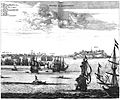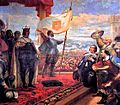Iberian Union facts for kids
The Iberian Union was a special time in history when the countries of Portugal and Spain (ruled by the House of Habsburg) shared the same king. This happened between 1580 and 1640. It wasn't a single country, but more like a family connection where one king ruled over several different kingdoms: Castile, Portugal, and Aragon. Each kingdom kept its own laws, government, and even its own colonies around the world. The king was the only thing that linked them all together.
Even though they shared a king, people from one kingdom were considered foreigners in the others. For example, a Portuguese person would be seen as a foreigner in Castile. The name "Iberian Union" wasn't used back then; historians made it up much later to describe this period.
Contents
Why They Wanted to Unite
Leaders in the Iberian Peninsula had dreamed of uniting the region for a long time. They looked back to the old Visigothic kingdom as an example. Centuries before the Iberian Union, kings like Sancho III of Navarre and Alfonso VII of León and Castile even called themselves "Emperor of All Hispania" (meaning "Emperor of All Spain").
There was almost a union much earlier! A young prince named Miguel da Paz (born in 1498) was the Prince of Portugal and the heir to the Spanish thrones. If he had lived, he would have become king of both Portugal and Spain, creating a union. Sadly, he died when he was very young.
Portugal's Golden Age and Challenges
The time from 1578, when Portugal had a big problem with who would be the next king, until the House of Braganza family took over, was a period of big changes for Portugal.
Portugal was very powerful because of its spice trade. This trade was at its peak when the Iberian Union began. It became super important after Vasco da Gama found a sea route to the East by sailing around Africa in 1497–98. This amazing journey completed the work started by Henry the Navigator. It opened up a very profitable way to bring spices to Europe by sea, avoiding the Middle East.
Troubles for the Spice Trade
As the 17th century went on, other European countries like the Dutch, English, and French started to cause problems for Portugal. They attacked Portuguese trading posts in the East and began to take over the Atlantic slave trade. This made it harder for Portugal to keep its near-monopoly on the valuable spice and slave trades, causing Portugal's spice trade to slowly decline.
The Habsburg kings, who ruled the Iberian Union, also used some of Portugal's money to help fight in the Thirty Years' War (a big war in Europe). This caused some stress within the union. However, Portugal did benefit from Spain's military power, which helped them keep Brazil and disrupt Dutch trade. All these events, especially those at the end of the House of Aviz rule and during the Iberian Union, made Portugal rely more and more on its colonies, first India and then Brazil.
Images for kids
-
Acclamation of John IV as King of Portugal, painting by Veloso Salgado in the Military Museum, Lisbon.
See also
 In Spanish: Portugal bajo la Casa de Austria para niños
In Spanish: Portugal bajo la Casa de Austria para niños
 | Frances Mary Albrier |
 | Whitney Young |
 | Muhammad Ali |





